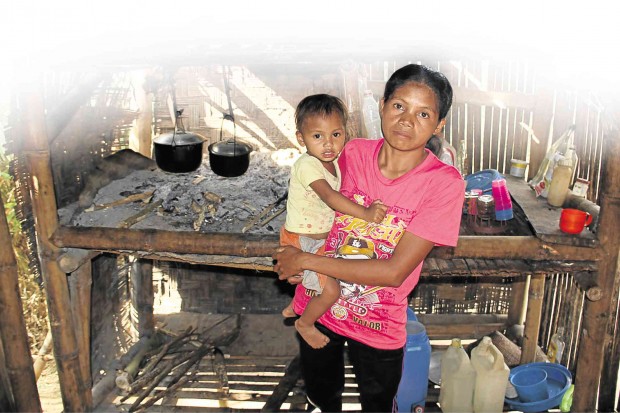
AN-AN Takilid, 28, carries her 2-year-old child, Febie Anni, inside their shack in the village of Kigan in South Upi, Maguindanao province. An-An lost her husband, Jimmy, who hanged himself after losing a bout with depression brought on by the ongoing dry spell. DENNIS JAY SANTOS
SOUTH UPI, Maguindanao—AT PAST 8 a.m. on Feb. 2, An-an Takilid, 28, and her three children went to fetch water from a nearby artesian well. When they returned to their small shack, An-an saw her husband, 37-year-old Jimmy, with a rope tied around his neck, hanging from the hut’s wooden trusses.
“He waited until we left,” the distraught wife said.
An-an said her husband’s suicide was poverty-driven. Jimmy, An-an said, could not bear failing to feed his family.
“We hardly eat, and if we have food, we take it during dinner,” she said.
Two years ago, Jimmy went through the same ordeal when their corn crops were destroyed by a rat infestation. He was unable to pay the debts he incurred from loan sharks who charged 5-percent interest per month.
Using his land as collateral, he again applied for a loan. Then, the El Niño phenomenon came, drying up farms.
Jimmy failed to find a way out.
“Our struggle with poverty, El Niño and the rats made it hard for him to replant,” An-an said.
Tito Balinto, the village leader, agreed. “Lack of food and means of livelihood are their main concern, and the dry spell made it harder for us, that’s what drove one of our members to take his life,” he said.
Pombaen Karon-Kader, an official of the Department of Social Welfare and Development (DSWD) in the region, said that had they known the fate of Jimmy, “we could have exerted more effort to help him.”
She expressed alarm over the fate of many others, who similarly struggle to cope with the effects of the dry spell.
“You know hunger can greatly affect one’s sanity,” she said, adding that they were also checking on a tribal woman, who was showing signs of mental distress.
South Upi Vice Mayor Remy Sioson said they assessed the needs of the farming villages.
“We have a population of about 13,000 households and 95 percent of which are affected by El Niño,” Sioson said.
Sioson said the immediate need was food.
Gov. Mujiv Hataman of the Autonomous Region in Muslim Mindanao (ARMM), said drought in the province was a challenge to his administration.
“Almost all resources [have been used],” he said.
“We tend to anticipate manmade calamities, but this [dry spell] is something we did not expect,” he said.
But Hataman said he had sought the help of President Aquino and written several agencies for assistance.
But while they continue to assess and monitor the situation, Hataman said food and farming aid had been given to affected families.
Secretary Alexander Alonto of the Department of Agriculture in the ARMM, said the drought had so far destroyed P140 million in crops.
“This figure may go up,” Alonto said.
Initial figures place the number of farmers hit by the drought at 27,000.
He said the department had started to distribute rodenticides and “heat-resistant-seedlings.”
Farmer Abogantao Saiduna, 56, said farmers in the province were no strangers to drought. The current one, though, is the worst, he said.
“I don’t have an alternative livelihood,” said Saiduna, father of eight children. “Right now, I hope for the rain to come,” he said.